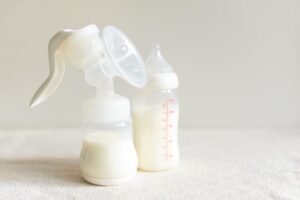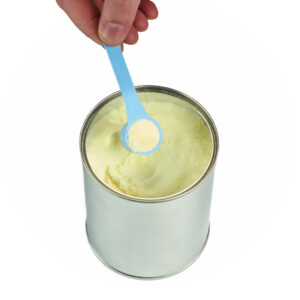Nourishing Our Next Generation 2024 to 2029
The co-produced infant feeding strategy, led by our partners at Kent County Council, sets out our ambition to empower all parents to make informed decisions about feeding their babies, and for mothers and families to have the support they need from those around them.
Feeding your baby can feel quite overwhelming at first – whether you are breastfeeding, bottle-feeding or a combination of both.
Breastfeeding

There is a lot of evidence to show how beneficial it is to breastfeed your baby, for both you and them.
Deciding how to feed your baby is a personal choice and the Health Visiting Team is here with tips and support to guide you through. They'll visit you at home when your baby is around 10 to 14 days old to see how you and baby are doing and to offer support.
If you have any feeding worries or concerns, the best thing to do is speak to your midwife or health visitor.
Your breastmilk is perfectly designed to help your baby grow and develop. Breastmilk has ingredients like antibodies, hormones and stem cells to help protect your baby now, and in the future. Breastmilk has an amazing ability to change to give your baby exactly what they need. The first milk you make after giving birth is called colostrum.
It is very concentrated and packed full of antibodies and immune cells, boosting your baby’s immune system from birth. Milk changes from colostrum to mature milk over the first few days. You might leak milk don’t worry if you don’t notice anything, this isn't a sign you don't have enough milk for your baby.
Breastfeeding is a skill that both you and your baby learn together. Positioning and attaching your baby is something that takes time to get the hang of. Breastfeeding shouldn’t leave you feeling sore. In the early days, you might feel a bit of discomfort while you and your baby are learning to breastfeed but this should go away.
A latch that isn’t quite right can cause a lot of pain. With the right support with positioning and attaching from a local drop-in or health professional, you should find feeding much more comfortable. Read about what to expect in the first few days at Beside You including how to tell feeding is going well.
You’re welcome to go along to a local breastfeeding drop-in for a chat if you do have any questions. The Infant Feeding Team offers breastfeeding groups where you can get support.
Donated breastmilk is vital to help save the lives of premature and very sick babies, whose mothers, for whatever reason are unable to provide breastmilk. Visit www.humanmilkfoundation.org/hearts-milk-bank/milk-donors if you’d like to donate some of your milk.
Local breastpump hire

You could get a free handpump or loan an electric pump for a set period if you are entitled to the healthy start scheme, if your baby arrived early or has been unwell. You must be receiving feeding support from a health or social care professional or a voluntary organisation. You can be referred by a professional or you can fill out the referral form yourself. For more information, ask at the reception of your local Family Hub. Visit Beside You to find more information and a venue near you to hire a pump.
It is also possible to hire a breast pump directly from the manufacturers Ardo or Medela.

Looking for breastfeeding support?
Beside You is here to help every step of the way.
Bottle-feeding
If you've decided to bottle-feed your baby, you may be wondering what formula milk to buy, what equipment you'll need and how to get the hang of feeding your baby when everything is so new.
Responsive feeding is giving your baby a feed when they show you signs they’re hungry and stopping when they show you they’re full. This makes your baby feel safe and cared for, supporting a close and loving bond between you and helping their brain to grow.
The Kent Health Visiting Service gives feeding support to all parents. You can phone your local team for advice or reassurance Monday to Friday, 9am to 5pm (except bank holidays).
Some families may need more specialist infant feeding support. Your midwife, health visitor or another health professional, such as your GP, can refer you into the Specialist Infant Feeding Service. You will be seen by one of the specialist infant feeding leads or a lactation consultant. Lactation consultants are highly trained and qualified specialists who can support mothers with complex feeding issues, including assessing babies with a suspected tongue-tie.
Starting solids is a big step for you and your baby. It can feel daunting with lots of information out there. Families in Kent share their experiences alongside expert NHS advice and tips from Kent Health Visiting Teams of introducing solids.
In their first-year babies will be getting most of their energy and nutrients from breast milk or first infant formula. Your baby should be introduced to a varied diet, alongside their usual milk. Most babies are developmentally ready for solids around six months of age. Visit our 'Introducing solids' page for more information.
Healthy Start
If you’re receiving a qualifying benefit and are pregnant or have parental responsibility for at least one child under the age of 4, you can apply online for the NHS Healthy Start card. This card can be used to buy milk, fruit and vegetables, pulses, and infant formula milk. You can also get vitamin supplements.
Useful resources
- What to expect in the first few days breastfeeding and find support when you need it at Beside You.
- Responsive feeding advice is available from UNICEF.
- Children Dietetics Team has useful resources on cow's milk allergy.
- Child health clinics - Come along to a child health clinic for advice, information and support for you and your child's health and development from your local Health Visiting Team. Remember to bring your baby's personal child health record (PCHR) or 'red book' to the clinic or other health appointments.
Page last reviewed: 01/01/2025, next review due: 01/01/2028
